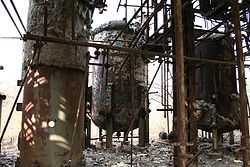Corporate crime refers to crimes committed by individuals who may be identified with a corporation or other business entity. Corporate crime involves acts like environmental pollution (corporate crime, such as the 1985 Union Carbide accident in Bhopal, India), fraud, dangerous work environments and making of unsafe products. Environmental crimes often result in death, injury and disease. A recent example of corporate violence is that of the 12 New Mexico campers who were killed in August 2000 when a natural gas pipeline operated by El Paso Natural Gas Co exploded near Carlsbad and more than 100 Americans have died in crashes linked to Firestone tire separations that caused their Ford Explorer vehicles to crash. Dr. Troyen Brennan, a leader of the Harvard University Medical Malpractice Study of New York State, stated that there are 100,000 deaths each year from hospital-based medical negligence. Thus, a huge number of people die every year on the job or from occupational diseases such as asbestosis and black lung. Job deaths often result from criminal recklessness. They are sometimes prosecuted as homicides or as criminal violations.
White-collar crime
What Businesses could do to prevent White Collar Crime?
Businesses can impose safeguards, to check on the conduct the employees. By making sure that records are preserved and by launching an internal investigation they could respond to allegations of wrongdoing. In order to ensure that employees are not engaging in unauthorized transactions they could audit banking activities.
A business that does not respond appropriately to criminal activity it could appear to be involved in that activity. If a business does not wish to be held responsible for illegal conduct the best way of doing so is to cooperate with any investigation of the wrongful conduct.
A business could be punished only in financial terms for example by imposing fines so large that the business is forced to close down. It is also possible to impose a term of "probation," during which the business can be carefully monitored by the court. However, it is not possible to impose a "corporate death penalty" as the corporation is not an individual but a legal entity.
Corporate crime – Damage on society
My opinion is that corporate crime inflicts a huge and enormous damage on society than all street crime combined. Corporate crime poses a significant threat to the welfare of the community. The potential for both economic and physical harm caused by a corporation is great given the pervasive presence of corporations in a wide range of activities in our society, and the impact of their actions on a much wider group of people.
Further reading:





No comments:
Post a Comment